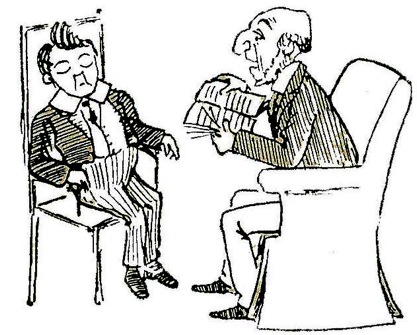
When I was a child, I was a great fan of the tongue-in-cheek “cautionary verses” of English poet Hilaire Belloc. I have written in the past about how, in the Alice books, Lewis Carroll took off after those heavy-handed Victorian moralists who tried to scare children into good behavior. Belloc did more of the same, only his poetry was even darker.
The titles in his Cautionary Tales for Children speak for themselves: “Jim, Who ran away from his Nurse, and was eaten by a Lion.” “Henry King, Who chewed bits of String, and was early cut off in Dreadful Agonies.” “Rebecca, Who slammed Doors for Fun and Perished Miserably.”
There was something about Belloc’s black humor that I found delightful as a child. It’s not that my parents were heavy-handed disciplinarians. On the contrary. In any event, I was a well-behaved child. As proof, I offer up the citation I received for “best-behaved child” in the fourth grade.
I say this without taking pride in it. In fact, my affection for Belloc’s poetry spoke to a secret rebellious streak. I understood that Belloc was satirizing adult attempts to scare children into being good and, perhaps because I was so determined to be good myself, I laughed at the images of children acting up. If comedy is a means of releasing anxieties, then I may have been anxious about coming up short and found humorous these obviously exaggerated repercussions for misbehaving. Put another way, I laughed with relief that, even if I was bad, the worst that could happen wouldn’t be as awful as what happened to these children.
One of my favorite poems was “Matilda, Who told Lies, and was Burned to Death.” I offer it to you here to lighten up the end of what has been a depressing week in world developments:
Matilda told such Dreadful Lies,
It made one Gasp and Stretch one’s Eyes;
Her Aunt, who, from her Earliest Youth,
Had kept a Strict Regard for Truth,
Attempted to Believe Matilda:
The effort very nearly killed her,
And would have done so, had not She
Discovered this Infirmity.
For once, towards the Close of Day,
Matilda, growing tired of play,
And finding she was left alone,
Went tiptoe to the Telephone
And summoned the Immediate Aid
Of London’s Noble Fire-Brigade.
Within an hour the Gallant Band
Were pouring in on every hand,
From Putney, Hackney Downs, and Bow.
With Courage high and Hearts a-glow,
They galloped, roaring through the Town,
‘Matilda’s House is Burning Down!’
Inspired by British Cheers and Loud
Proceeding from the Frenzied Crowd,
They ran their ladders through a score
Of windows on the Ball Room Floor;
And took Peculiar Pains to Souse
The Pictures up and down the House,
Until Matilda’s Aunt succeeded
In showing them they were not needed;
And even then she had to pay
To get the Men to go away!
It happened that a few Weeks later
Her Aunt was off to the Theatre
To see that Interesting Play
The Second Mrs. Tanqueray.
She had refused to take her Niece
To hear this Entertaining Piece:
A Deprivation Just and Wise
To Punish her for Telling Lies.
That Night a Fire did break out–
You should have heard Matilda Shout!
You should have heard her Scream and Bawl,
And throw the window up and call
To People passing in the Street–
(The rapidly increasing Heat
Encouraging her to obtain
Their confidence) — but all in vain!
For every time she shouted ‘Fire!’
They only answered ‘Little Liar!’
And therefore when her Aunt returned,
Matilda, and the House, were Burned.

